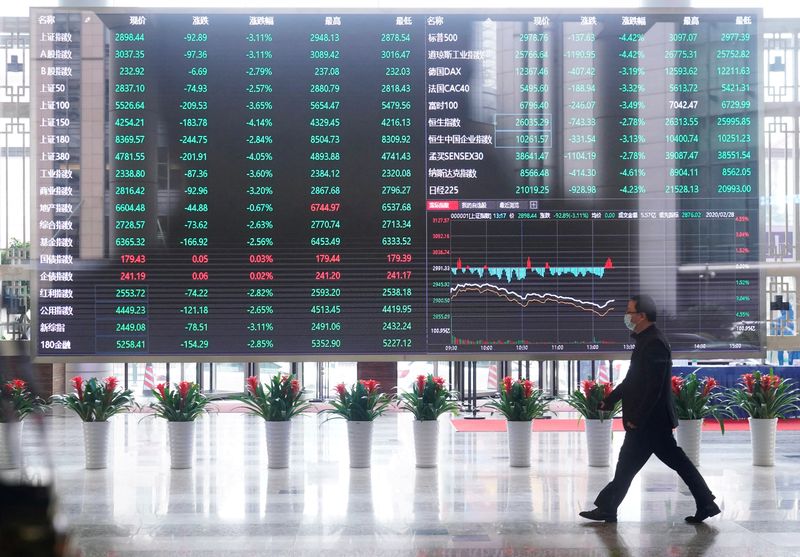By Suzanne McGee and Megan Davies
(Reuters) - Three straight years of losses from Chinese markets and anti-Beijing rhetoric from Washington have not deterred some U.S. asset managers from introducing products they hope will thrive if Chinese stocks rebound.
China's markets have been hit by a long-lasting property crisis, slowing growth and geopolitical tension. The Institute of International Finance estimates $80 billion of outflows from Chinese portfolios last year, and the bellwether blue-chip CSI 300 Index has fallen 43% from its record high of three years ago. China's markets, which reopen on Feb. 19 after the Lunar New Year holidays, are down nearly 2% year-to-date, bouncing off lows on support measures from Beijing.
Despite the extended pain, U.S. fund managers with China-focused products have been betting that investors will want to return to the market, arguing that valuations make the country hard to ignore.
China's CSI 300 index currently trades at 12 times trailing 12-month earnings, while the S&P 500 index's valuation is at 24 times 12-month earnings, according to Morningstar Direct.
"This is potentially a once-in-a-lifetime opportunity to buy China equities at valuation levels not seen for a long time," Jonathan Krane, CEO of China-focused ETF provider KraneShares, said in an email.
KraneShares has launched four new China-focused exchange-traded funds since the beginning of 2021. Its roster also includes one of the largest China-focused ETFs, the KraneShares CSI China Internet ETF. Launched in 2013, it has about $5 billion in assets.
China's sheer size and economic growth rate - even if lower than in past years - means investors need to have it in their allocations, fund managers argue.
"Do we fundamentally think that the second-largest economy in the world plays a role in investor portfolios? Yup, no question," said Bryon Lake, global head of ETF Solutions at JP Morgan Asset Management. The firm launched the JPMorgan Active China ETF in March 2023, which now has about $9.2 million in assets.
In total there were four U.S.-based, China-focused ETFs launched in 2023, compared with two the prior year and eight in 2021, according to Morningstar data, making a total of 48 US-based, China-focused ETFs at the end of 2023. That takes into account both openings and closures and is a figure little changed in the last several years but up 46% in the last decade.
CHALLENGES IN CHINESE MARKETS
Fund managers, however, have both economic and political challenges with China's markets, from U.S. scrutiny of Chinese investments to an unpredictable environment in China, where there can be sudden resignations or regulatory crackdowns.
"The bear market scenario for China revolves around government policy, trade relationships and other political actions that surprise market participants," said Rich Nuzum, global chief investment strategist at Mercer (NASDAQ:MERC).
The dour sentiment has led some funds to close. Global X Funds plans to shutter ten of its 11 China-focused ETFs, which target a specific sector and together have an average of $7 million in assets. The remaining fund, the Global X China MSCI Consumer Discretionary ETF, is the largest, with assets of $215.4 million.
Global X "probably went a step too far in anticipating that there'd be a China recovery and that it would be broad enough to spill over into sector funds," said Bryan Armour, ETF strategist at Morningstar. "Slicing up the China market that specifically" may have been over-optimistic, he added.
Global X declined to comment on the closures and could not be reached for comment on the assessment of why they closed.
BUILDING BLOCKS
China-focused asset managers hope that being ready with an established fund -- complete with a track record -- will position them to profit most if China rebounds.
Since it typically takes at least six months to roll out a new ETF and the process can be longer for asset managers that have to venture into new territory, having a product with a track record ready to scoop up fast-moving inflows can transform a tiny fund into a large player overnight.
"There are tremendous first-mover advantages in the ETF space" for asset managers willing to battle the headwinds, said Michael Barrer, head of ETF capital markets at Matthews Asia.
Matthews Asia, an investor in China for nearly 30 years, has launched a dozen ETFs targeting Asia, including two devoted to China and several others that include Chinese stocks since July 2022. "That way, when the tide turns, we have product that is readily available."
The firm launched the Matthews China Active ETF last July and the Matthews China Discovery (NASDAQ:WBD) Active ETF in mid-January. The latter targets smaller growth stocks.

In any environment, launching new products -- and keeping existing ETFs alive -- requires careful planning, issuers say.
"Having or adding a China-focused ETF to your family may make perfect sense, because this is a 'building block' that investors will want to use strategically" to get exposure to the world's second-largest national economy, said Matthew Bartolini, head of SPDR Americas research for State Street (NYSE:STT) Global Advisors.